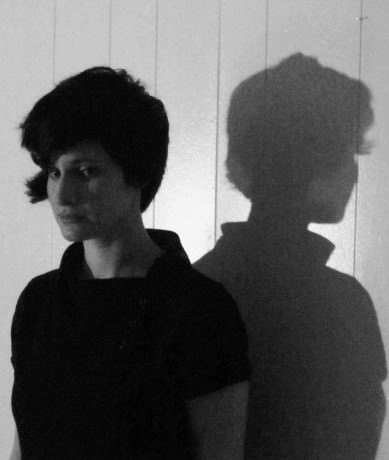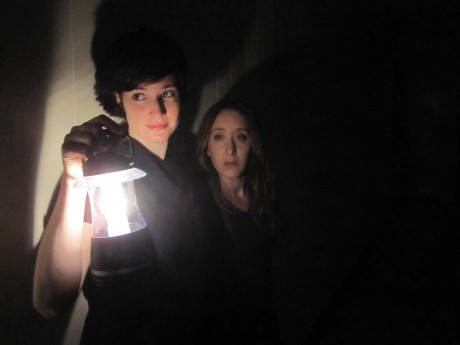Everything goes away at some point. The people we love die, the causes we fight for fade away, were are living in just one brief day that pales in comparison to the entire existence of time throughout history. Even we die.
A provocative new work, Fallbeill, written by Liz Maestri, makes its Baltimore area premier at the Glass Mind Theatre as they open Season Four: “National Bohemia.” Directed by company member Alexander Scally, Maestri’s genre-straddling new work of historical fantasy and time-traveling fictional reality is the new frontier for artistic integrity in the Baltimore theatre scene. With well-developed characters and dual paralleling plotlines that are both poignant and relevant to the everyday struggles of life while making a commentary on the politics and social situations of the past this new work evokes deep thought and wild emotions among audience members.

The story takes place in present time in Germany, where a young woman, Else, is currently coping with a wartime injury of her brother. She spends her drunken days in the cemetery at the graves of Sophie and Hans Scholl, wartime ‘heroes’ from Nazi-occupied World War II. Their notoriety stems from their involvement with the White Rose movement, their swift and unjust trial in the people’s court, and ultimately their execution by guillotine. The story grows immensely fascinating when Sophie’s ghost is able to communicate with Else and the pair begin to share their stories, realizing that their lives are not all that different. Maestri’s work layers rich haunting stories, fully formulated scenarios, and wildly fantastical creative notions that spark emotions in this characters making this an epic journey to be experienced upon the stage.
Symbolism becomes an important factor in plays where time lines blur and the past and present cross. Lighting Designer Kelvin Pittman chooses a particularly clever fashion to not only delineate moments from the past and present, and various locations but also slides subtle meaning into his lighting choices. Playing with reds, blues, and harsh white lights, Pittman keeps the scenes at the graveyard in subdued blue, making the characters appear more ghostly and subtly representing the manner in which they are frozen by time; trapped as ghosts unable to move forward or backward in their histories. Darker red lighting comes into play for horrific moments in Sophie’s memory, mainly her inquisition and execution; the symbolism of red in general not only in the way it generates the image of blood but of darker unpleasant times fits flawlessly into these heavier moments. Pittman uses softer brighter light for positive recollections in Sophie’s past and a more natural indoor light for scenes that take place in the present with Else. All of this design work further enhances the experience and creates beams of clarity for this non-linear show.
Costume Designer Jessica Ruth Baker distinguishes present fashions from those of the World War II era with ease, but Baker’s finest decision is the way in which she represents the tragic deaths of Hans and Sophie. A simple red silk scarf, one tied around each of their necks, a constant and bright reminder that they were beheaded for speaking out against Hitler and the Third Reich. Baker keeps things simple, white clothing for Sophie to make her look even more haunted in comparison to Else’s dark and almost morbid threads.
Director Alexander Scally promotes a unified ensemble feel among the cast, allowing them to develop strong inter-character relationships even in moments of passing between characters that never interact, like Hans and Karl. Scally attempts to further unite the performers by bringing them together at the beginning of the show and again at the end of the show by having them sing a song in German. This was the one moment of the show that felt out of synch with the rest of the production. The performers are very soft when they sing this song, and some of them sound nervous; while the sentiment and symbolism behind the German song (which in the beginning of the show is then repeated in English) seems appropriate it just doesn’t mesh well with the remainder of the performance, which was stellar.
Tripling up his roles as Fritz, the Interrogator, and Else’s comatose brother, Maxwell Heaton creates a strong presence in his Nazi-youth character. Speaking coldly and directly without any emotional input behind his words feels fitting for someone portraying a Nazi in training. That is not to say that Heaton is not an emotionally adept performer. There are moments in the performance toward the end where feelings of remorse and regret creep into his voice as his character Fritz is forced to play the ‘role’ of the Interrogator; a rather shocking transformation to behold.
Karl (Joshua Buursma) acts as a force suspended in the balance of reality. While the Karl character exists in present time with Else, it is clear that his emotional struggle in dealing with Else’s brother keeps him from being actively present and able to help Else with her own emotional battles. Buursma gives an exceptional performance, particularly when he has his brief, but fully escalated, emotional outburst in Else’s room. Watching Buursma transform from a relatively calm and aloof character into this man with surging feelings is wild.
Hans (Vince Constantino) is an intriguing character as we only truly encounter him in Sophie’s memory, making the audience wonder if what we see is who he was or merely how Sophie remembers him. While he is encountered briefly at the grave in his ghost state, he does very little speaking. Constantino’s performance as a ghost, however, does provide little sprinkles of levity to the otherwise heavy drama, watching him ‘interact’ with those that cannot see or hear him causing little pockets of amusement. During scenes of rebellion, all in Sophie’s memory, Constantino gives a riveting rendition of a revolutionary on the verge of winning his cause.
Sophie (Rachael Lee Rash) and Else (Jacqueline Chenault) are the carrying conduits of this performance; their link— be it supernatural across the years, or just similarities in their struggles and existences— is a fortified one that makes this piece of theatre a truly compelling new work. Both performers are extremely intense in their portrayal of the strong female leads, both grounding themselves deeply in the emotional turmoil that their characters are experiencing. Chenault, as the woman living in the present and struggling to cope uses her facial expressions to say what her words often cannot. And when she does find words with which to express her character’s grief, they are that much more powerful. Her exasperation and strife in moments of trying in vain to save Sophie from her own past are gripping.

Rash gives a phenomenally intense performance; encapsulating every element of a ghost trapped in her own cyclical remorse. While it is evident that Sophie does not regret, the fear and worry shines through in Rash’s eyes, voice, and overall physicality. There is something truly haunting about her performance that makes you watch her every move, makes you hear her every word, and makes your heart desperately plead with her over her choices. Rash creates moments of palpable tension and soul-flooded emotion in her pauses of silence; really letting the emotional gravity of the situation radiate out over the audience. Her story is astonishing and Rash delivers it with vigor.
It’s new and innovative theatre, a genre worth investigating, and Fallbei is a drama worth seeing. Though the run is limited, the show speaks to the artistic values and mission statement of both Glass Mind Theatre and their temporary production space, The Strand Theater.
Running Time: Approximately two hours, with one intermission.
Fallbeil plays through November 24, 2013 at the Glass Mind Theatre at Strand Theater— 1823 N. Charles Street in Baltimore, MD. For tickets (443) 475-0223 or purchase them online.





